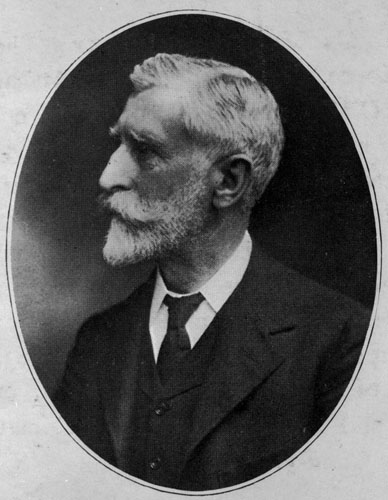I had another “Curiosity” piece published in the magazine of this morning’s Irish Times.
This time about a disreputable ancestor: William Martin Murphy
A Family Skeleton

I SUPPOSE WE all have a skeleton in our closet – if not our own personal specimen, at least one in our family history which rattles from time to time as it tries to get out. Mine is William Martin Murphy.
Quite a lot of people will have a notion that his name sounds familiar. His chief claim to infamy was his part in the Lockout in Dublin in 1913.
My connection to him would have been that his father was my great great great grandfather, or he was my great great grand uncle.
Murphy seems to have spent his life losing friends and being a bad influence on people. On the plus side, he founded the Irish Independent , and seems to have organised most of the railways in Ireland. It was, however, with his ownership of the Dublin tramway system that he came head to head with Jim Larkin, and thus entered the history books as the man who turned the key of the great Lockout. Mind you, Murphy had other claims to infamy as well as the lockout.
Being a devout Catholic, he was instrumental in blackening Parnell’s name when the affair with Kitty O’Shea was exposed. He vigorously opposed Yeats’s efforts to find a suitable place to house the Lane Bequest. (As a result, that legacy is still floundering in the middle of the Irish Sea).
There is no doubt that he exploited and underpaid many of his workers and was, in terms of art, a philistine. But, as well as organising Ireland’s train network system, he founded many industries that still stand today.
He was, by his own lights, a nationalist and refused a peerage from Queen Victoria at one stage in his career.
The final piece of information I have about him was gathered only last year. It appears that Samuel Beckett carried a candle for a beautiful young woman for many years, much as Yeats did for Maud Gonne. This girl, Eva Murphy, was also in love with Samuel while he was a student. She was Catholic, Beckett was Protestant.
Her father would not hear of the alliance, and separated the young lovers. Young Beckett was heartbroken. Who knows how this may have affected his future writings. The young woman’s father was, of course, William Martin Murphy.

Comments
Peter
on December 7, 2008I’ve been enjoying the flurry of recent posts, and that award was a great coup for Deirdre. What with book launches and so on, there seems to be major Dwyer occasion in Cork on a weekly basis. And lovely to see your Murphy piece – congratulations on that. Allow me a bit of pedantry: I thought the ages for Sam and Eva didn’t quite match, and sure enough according to Cronin’s biography it was Sam’s father Bill who had the thwarted passion for Eva. Now, if they had married (and had Sam the Same) you and he would have been cousins, I guess. Whoop, whoop!
Martin
on December 8, 2008Peter you are right. I got the story from Blair’s biography and she obviously was confused. According to the family tree, which I just unearthed and searched, Eva Magdalen Murphy was born in 1880, 26 years before Sam. Many apologies, but still an intriguing connection!
Rob Martin Murphy
on December 9, 2008Hi Martin,
I’m Rob Martin Murphy. I’m a direct descendant of WMM. He’s my Great Great Grandfather. Hence, my full name being Robert William Martin Murphy. My father Christopher (Chris) married my Aussie mother and moved to Australia in 1970. I was born here in Sydney in 1972. So there you go. Small world, as they say.
Cheers
Rob
Gerald M. Murphy
on March 11, 2012Another bit of pedantry. Beckett’s father had a romance with Eileen Frances Murphy, not Eva. (Cronin).
Eileen later married Sir Arthur Chance.
The comments are closed.